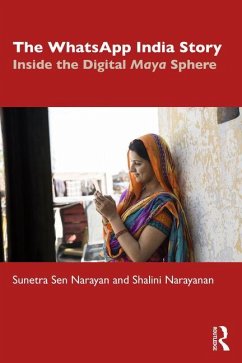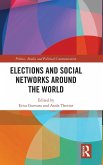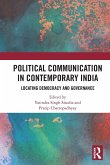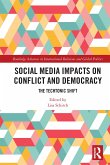WhatsApp is used by over half a billion people in India today in all fields - in business, corporate and informal sectors, in government, for education and among friends, families and acquaintances. This book critically explores the social messaging app's rapid expansion in India and its growing influence and looks at whether, as a form of horizontal communication, it poses a challenge to more traditional structures of communication.
The book examines WhatsApp's spread in the personal and professional lives of Indians and the myriad ways in which people in India are using the app in social and business interactions, including among people living with disabilities. Using case studies, interviews, surveys and in-depth research, it analyses key aspects of WhatsApp's massive popularity and its impact on how people communicate. It also explores its impact on the psycho-social dynamics in India, including the dissemination of fake news and politically motivated content, and the consequent need for media regulation in the country.
One of the first books to analyse the pervasiveness of WhatsApp and social media apps in different areas of Indian society, this book will be of interest to scholars and students of media studies, communication studies, digital media, cultural studies, cyberculture studies, sociology and social policy and media law.
The book examines WhatsApp's spread in the personal and professional lives of Indians and the myriad ways in which people in India are using the app in social and business interactions, including among people living with disabilities. Using case studies, interviews, surveys and in-depth research, it analyses key aspects of WhatsApp's massive popularity and its impact on how people communicate. It also explores its impact on the psycho-social dynamics in India, including the dissemination of fake news and politically motivated content, and the consequent need for media regulation in the country.
One of the first books to analyse the pervasiveness of WhatsApp and social media apps in different areas of Indian society, this book will be of interest to scholars and students of media studies, communication studies, digital media, cultural studies, cyberculture studies, sociology and social policy and media law.
'This book tells many stories that together provide an overview of the phenomenal penetration of WhatsApp into all walks of life in India-from personal messaging to professional communications, from politics to business, from prosocial uses to antisocial abuses-providing rich fodder for research and media literacy campaigns.'
-S. Shyam Sundar James P. Jimirro, Professor of Media Effects, Penn State University, USA
'This book is an important effort to holistically explore the influence of WhatsApp in India. The content involves issues of interest for both general and academic audiences and is presented in a lucid manner. The authors explore the use of WhatsApp in a wide variety of real-life contexts which adds to the richness of the content and relevance of the book for non-academic audiences.'
-Dr. Jatin Srivastava, Professor and Director, Institute for International Journalism at Ohio University, USA
'This book offers a systematically researched deep dive into the social media phenomenon that is changing generations across geographical and class barriers with wildfire speed, challenging, empowering and threatening the social fabric, keeping policymakers and administrators struggling with new-age puzzles to solve.'
-Madhavan Narayanan, Senior Editor, Technology & Political Economy Analyst
-S. Shyam Sundar James P. Jimirro, Professor of Media Effects, Penn State University, USA
'This book is an important effort to holistically explore the influence of WhatsApp in India. The content involves issues of interest for both general and academic audiences and is presented in a lucid manner. The authors explore the use of WhatsApp in a wide variety of real-life contexts which adds to the richness of the content and relevance of the book for non-academic audiences.'
-Dr. Jatin Srivastava, Professor and Director, Institute for International Journalism at Ohio University, USA
'This book offers a systematically researched deep dive into the social media phenomenon that is changing generations across geographical and class barriers with wildfire speed, challenging, empowering and threatening the social fabric, keeping policymakers and administrators struggling with new-age puzzles to solve.'
-Madhavan Narayanan, Senior Editor, Technology & Political Economy Analyst








